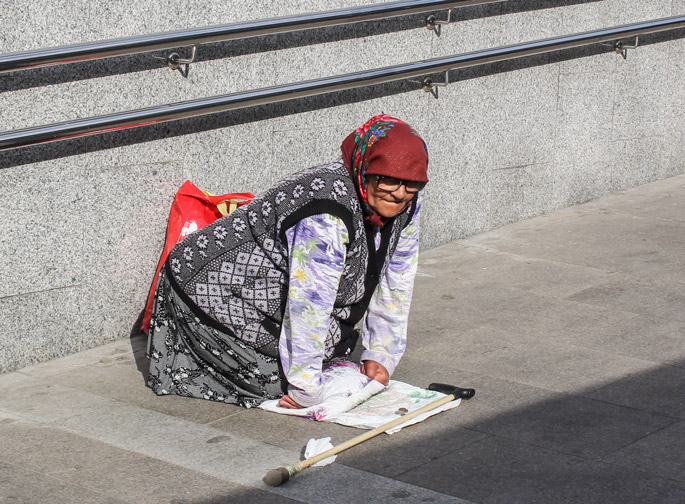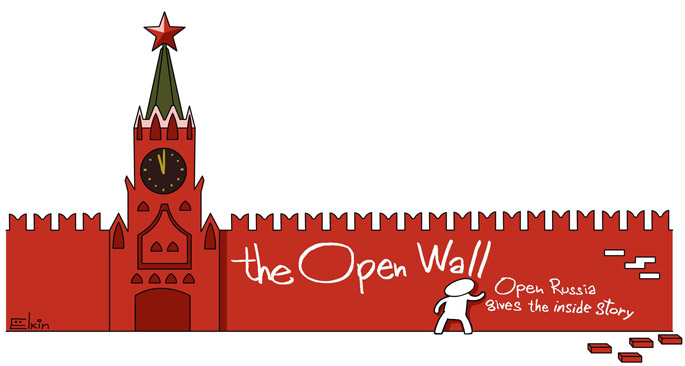Beggar thy Neighbour
Beggar thy Neighbour
The Russian government has shifted the burden of the economic crisis onto the shoulders of the population. But for how long will they put up with it?

Begging has once again become a phenomenon in Russian urban life. While things haven’t changed a great deal on Moscow’s New Arbat, what with government limousines still whizzing up the street on their way to the Kremlin, sirens wailing, the Arbat underpasses are becoming increasingly packed with destitute individuals who need money for food and medicines.
Real incomes have plummeted in Russia for the fifteenth month in a row, with consequences that are only to be expected: according to sociological surveys, 54% of Russians cannot currently afford to buy anything other than food and the most basic necessities, while 73% of households lack any savings whatsoever. Over the course of the previous year, according to Rosstat, the statistics agency, the number of Russians in poverty – defined as those living with monthly incomes of less than 9,452 roubles ($143) – rose by 3 million people; and 19 million Russians now endure below-subsistence incomes.
Russian pensioners have always teetered on the brink of poverty, but in 2016 their situation could well become entirely desperate – from this year onwards, the government will index pensions at a rate well below inflation (while prices went up by a massive 15.5% in 2015, in February of this year pensions were indexed by a mere 4%). It’s likely that 2016 will see a further increase in pensions, on account of the upcoming Duma elections, but it is also clear that the regime’s generosity will not extend beyond election cycles, witness the indexation of pensions for working pensioners, which has already been abolished; in other words, we are already seeing what is effectively a creeping expropriation of pensions.
In the main, pensioners have been surviving by reducing consumption; but prices of cheaper groceries and foodstuffs are rising more swiftly than those of more expensive items, prompting some seniors to resort to extreme measures. Viktor Shenderovich, satirist, journalist and prominent opposition figure, has remarked how the face of begging has changed in Russia: “Twice now, I’ve seen women with higher education out on the streets. These aren’t professional beggars. These are women who’re too embarrassed to actually beg. One was just standing there with a plastic bowl. I was on my way from the show, but, with a face like hers, she too should really be sitting in the auditorium of the Moscow Art Theater. But two or three tickets to the MAT would probably eat up her entire monthly pension.”
Families with children comprise 70% of Russia’s poor. On the face of it, many of them might have expected to see a rise in their incomes, but the government has changed the way it calculates average pay, thereby reducing its value. This manoeuvre has allowed Vladimir Putin’s social decrees to be enacted “on paper,” yet, at the same time, Putin has also robbed many public sector workers of any hope of a real-terms salary increase. Unless incomes rise, many households – even those with employed breadwinners – will barely be able to make ends meet.
Meanwhile, the regime has also announced its intention to hike the minimum monthly wage by 21%. It might seem futile to look for evidence of any subterfuge here; this gesture, motivated though it is by the upcoming elections, would appear to evince a real concern on the part of the regime for the welfare of Russia’s citizens. But things are more complicated than they seem. In violation of Article 133 of the country’s Labour Code, Russians on minimum wage have incomes below the minimum subsistence level. The Russian monthly minimum will be rising to a mere $109. To survive on this kind of money will be virtually impossible – but anything more than a token gesture is beyond what the regime can afford, even in the run-up to the elections.
Furthermore, the drawbacks of raising the minimum wage are even more obvious than the advantages: as Vedomosti observes, social insurance contributions by private entrepreneurs and the self-employed depend on the minimum wage. Increasing these will lead to job cuts and the eradication of some of those same, much-needed private entrepreneurs. “Even in more prosperous years,” the newspaper remarks, “the upshot of minimum-wage increases was a slump in official employment and a rise in cash-in-hand jobs.” It may well be, then, that the government’s decision to raise the minimum wage was motivated not by any concern for Russia’s workers, but simply by the desire to squeeze money out of the country’s “grey” economy.
Poverty in Russia isn’t something that keeps the president up at night. According to the official website of the Kremlin, the very word “poverty” has featured only ten times at official events involving the head of state during the crisis period of 2014-2016; and on half of these occasions, the subject was brought up by Putin’s interlocutors. When broached by the president himself, the question of poverty was either discussed in abstract terms as one of the threats facing humanity, or mentioned with specific reference to Ukraine, or else just touched upon in passing (for example, in the context of the war on drugs).
But consider the number of times Putin has publicly brought up Russia’s foreign policy agenda in the same period: 560 mentions of Ukraine, and 201 of Syria (source: Kremlin.ru). It’s clear to see where his priorities lie. When a political regime sees more value in the waging of far-off wars, than in any attempts to solve the problems of ordinary citizens, that regime can safely be called inadequate – and it’s just as safe to say that it won’t last forever.




